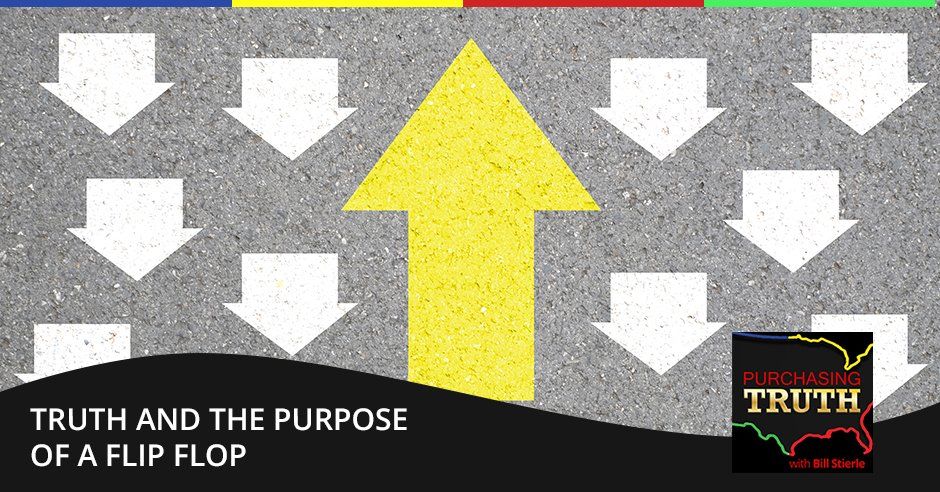Truth And The Purpose Of A Flip Flop
Subscribe Today!
We recently see President Donald Trump vacillate on the issue of whether the states should open up their economies as the nation continues to fight against the coronavirus pandemic. A flip flop is not a politician’s best friend as it can cause constituents to question their integrity. Yet the president seems to be doing it now as he tries to take total authority at first and then avoids accountability the next day. Was the recent controversial flip flop intentional or not? If so, what was the purpose behind it? Bill Stierle and Tom attempt to answer these questions and arrive at the conclusion that the flip flop is just another marketing strategy designed to meet Trump’s need for acknowledgment. The show must go on, apparently, and the flip flop is just there to make sure the viewers stay on after the commercial break.
---
Watch this episode here
I bet you do. It’s exasperating. Our need for stability is not being met. Stability is a casualty when you hear two very different messages. It’s like, “What is it? Is it this way or is it this way?” That’s the problem is truth gets pooled between this thing or this thing. If we’re going to claim truth back for us as a reader or have a healthy discussion/argument with somebody that is staying with a very narrow narrative, we’ve got to do something about mixed messages. There have been a few different messages that have come up, Tom, over the last couple of months. It gives us a lot to talk about. What is the purpose of these different mixed messages?
I’m very curious to learn the purpose because it appears like it was unintentional. Although, I have a feeling you’re going to tell me that it was intentional. We had the President saying, “The President, the executive in the United States has total control, total authority over the states to dictate when they reopen for business.” The fact checkers questioned and said, “I don’t think the President has read his Constitution,” but that’s what he was saying. He came back very quickly within days to say, “It’s up to the states.” To me, it was like, “He’s trying to take control at first. All of a sudden, he’s trying to shirk any responsibility or accountability for what the consequences are of the state’s opening. It’s up to the states. It’s up to the governors.”
In the past, politicians even to this day are judged and criticized on the flip-flop. “You said it once, you said it this other way, which one is it?” “How can we trust that you still aren’t the way you used to think about it even though you’re saying you think about it this way right now?” In the past, a politician would have to fight through that and it’d be hard. You voted this way and now you’re saying something different. What they were literally doing is questioning the integrity or the stability of that person.
That’s exactly the word that came to my mind was integrity.
Is this person integrous or are they going to bend in the wind? That’s the whiplash. When done well, when done with integrity, there’s nothing wrong with a flip-flop. When done with integrity, it’s, “My view set was this and now my view set has evolved to that. I was trying to meet the need for stability to where the country, the voter was doing, but what’s in the best interests of the country is this. This is one of the biggest problems in our healthcare discussion, which is here’s the stability, 1/6 of our economy being done this way. Here’s the well-being of every American that takes a breath on this soil. This is what health looks like and here’s how we can do it in more of a cost-effective way.” Which party would you say is the party that stands for cost-effectiveness, Tom? As politicians, they would say fiscal budgets, no overspending.
The purpose of the flip flop is to create controversy, and controversy creates eyeballs and meets the need for acknowledgment.
CLICK TO TWEET
Republicans would be great.
That is a narrative of theirs in the past. If you apply that narrative to healthcare, they are not congruent because we’re spending more money than we’re getting in value. It is not an efficient system. It’s not cost-effective. It’s very expensive.
It’s a for-profit system for the most part.
Notice they’re not in alignment with the integrity of fiscal responsibility, efficiency and effectiveness inside a business sector. They and the people that are funding that are not interested. Whereas Republican becomes protection for the status quo, for wealthy Americans, for the belief structure that they’re going to get votes for where the person, not those other people because those other people are doing things we don’t understand called collaboration and cooperation. We don’t understand collaboration and cooperation because it gets messy. It’s not comfortable. You may notice it’s not comfortable to be in a discussion and have to work out a mutual decision because you might not get your choices.
Can you imagine that, people don’t like things their way? What we’re experiencing is the unhealthy flip-flop. The unhealthy flip-flop is, “I am going to listen to this point of view and say that and I’m going to listen to this viewpoint and say that. I am going to respond this. I am going to look for eyeballs, attractions. I’m going to look for likes. I’m going to look for how many personas are responding to this. I am going to test my metrics by the easiest way possible.” What is the easiest way possible to test metrics? Twitter, likes and follows.
Let’s touch on the second flip-flop that occurred, which is the President being very vocal about how governors can open up their states when they want. I’m supportive of that. They can open them up. They should open up. We’d like to see it happen as soon as possible. Georgia announces they’re going to open very quickly. Initially, the President was supportive of it. He, in fact, even called the Georgia governor and said, “You’re doing a great job. I agree with what you’re doing.” He ends up flipping on him the very next day. A lot of the headlines are that the President threw the governor under the bus. He came back and said, “The governor is free to do whatever he wants. He can do what he thinks is best for his state, but I wouldn’t do it. I don’t think it’s a good idea to open it up now. It’s a little too soon.”
What is the good reason then? The purpose of a flip-flop is to create controversy. Controversy creates eyeballs. Eyeballs create people watching you. Watching you meets your own need for identity and respect. It meets your need for acknowledgment. It demonstrates a form of leadership when you can give one message. They give a different message and then another people react.
You give a different message and another person reacts. That’s not a way to run a country. By demonstration, that’s not a way to run a business. If you run a business that way, people stop believing you because they look at the numbers and they say, “You don’t have enough money to get this done. We’re pulling our investment now,” or “We lost our investment. We’ll never invest in you again,” because trust isn’t there. The greater casualty is the need for truth and trust by doing a flip-flop because integrity is in question.
I’m still a little confused, Bill. Let’s take the example of Georgia. The governor there is Brian Kemp. He’s the one that was showing Donald Trump loyalty. He’s shown him all kinds of loyalty. Donald Trump probably helped him get elected in 2018 in no small part.
That was a pretty close race if I remember it right, with Stacey Abrams running against him. He’s shown loyalty to Donald Trump. Donald Trump says, “The states, it’s up to them. They can open up when they’re ready. I’m supportive of you, Governor Kemp.” The next day, “I wouldn’t do it. I don’t think it’s a good idea.” The headlines were Donald Trump Threw Brian Kemp Under the Bus. What is the purpose of this flip-flop for Donald Trump? Was it intentional?
I think that most of the time, it’s a groomed habit to get somebody to come back after a commercial break on a TV show.
It’s seizing the news cycle the next day.
It’s a good reason why. The purpose of a flip-flop is I want the new cycle to talk about the thing so that they cannot deepen into or look underneath the covers of this thing that I haven’t done anything about. I don’t want them to look at places. I’d rather look at this issue with the Georgia governor than to focus on my unwillingness to take an executive action towards the public well-being because that’s not a part of my mindset. My mindset is I don’t want to do public housing. I want all of these poor people out of this building so I can renovate this building and I’m not going to public housing. I am not a good public steward. I’m going to buy a building. I’m not going to fix anything in it, even if I get cited or fined until these people are so miserable that their water or their toilet or whatever doesn’t work that they move out. They can’t take it anymore.
He’s playing the long game of if I ignore a social service issue, it will go away. I will make money at it. I will get respected by it because I am not interested in the larger country’s human issue. I am interested in how much you can pay me. It better be at the highest price possible. That’s the mindset and the habitual focus. In order to do that, I’ve got to continue to stay in the place of distraction. Is it intentional? You and I can debate the mental status of whether or not he is doing it intentionally or not intentionally. I tend to go and say most of the time people are acting out of their habit brain, not out of their conscious brain. He is a creature of habit too. If somebody says, #FireFauci, he retweets that and you say, “Why didn’t you retweet that? Did you see the number of reactions it got to stir the pot is why I did it? That’s problematic to run a government with somebody trying to stir the pot when government is about creating a safe infrastructure for capitalism to run off of. Capitalism can’t run social service programs.
The government is there for stability, safety and certainty. There’s a lot of uncertainty lately more than usual, but there have been things the government can always be counted on to do. For instance, when there is a natural disaster, when there’s a hurricane in a state or in multiple states, the federal government comes in to support the people. It doesn’t matter if the state has a red governor or a blue governor, but to see what’s been happening lately where the President is like, “Liberate Michigan, liberate Minnesota, liberate Virginia.” Now it’s not about, we’re all in this together and these hurricanes hit all of America equally. He’s creating classes of Americans based on the governor of their state.
His mindset has a tragic limited narrative. I’ve made this analogy last time. This is a nationwide Katrina is what this is. I’ve made that statement before. This is a national Katrina with all the trauma patterns that go with it, with all the anxious, the worry, nervous, scared. The biggest problem is psychological. There are deaths. These situations are happening the way they’re happening. At the same time, the greatest problem is psychological transition from where the trauma took place back to some kind of normality. During the economic crash through the real estate bubble, that was 2.5 years, most people were psychologically and financially trying to dig out of it.
The interesting thing, Bill, is I was surprised at this latest flip-flop where he was in support of states doing their own thing and then he comes back and by all appearances throws a Republican governor under the bus or certainly leaves him out on the end of a plank on a zone off the ship. He’s pushed him at the end of a plank on his own. I was surprised at that on the one hand because I thought it was out for character him.
I’m going to be the governor and you be Donald Trump and watch how he uses this as. I don’t know all the details if this is fully true. I’m going to fact check myself, but generally speaking, the conversation might sound like this. “Our state taxes are very low or in some cases we don’t collect much state taxes, but we do collect extensive sales taxes. In order for our economy in Georgia to get back going, we need to get people back to work because we’re not taking the level of property taxes that they are in California. We’re not doing the taxes.” All of these different things moving forward in the future. I’ve got to get my state back to work.
Donald Trump said, “Yeah, governors, you can run your own state.” He comes back and says, “I don’t think it’s a good idea.” He was working very hard. He says, “I respect him for doing what he feels is best for his state and he can do what he feels is best for his state. It’s too soon. I wouldn’t do it. Not quite yet.”
Here’s how it could have went better for Donald Trump. Here’s how it could have went better for the governor. I’ll play both parts. Who would you like me to do first?
Do Donald Trump.
We’re all in a difficult situation right now. How do we meet the need for health, care and protection for our citizens of the United States, at the same time has faced the financial concerns that each state faces? Those governors are put between a rock and a hard place because some of them have taxes that are based on sales tax. Some of them do not. Each governor has its own set of problems with their financial issues. Donald Trump doesn’t have this narrative.
No, he doesn’t. If he did that, would that land very well? It makes some sense that not all states are in the same boat. That’s a reason why they might approach things a little differently.
The governor of Georgia is in a very difficult situation because he’s got to meet the need for financial stability for his state. At the same time, he is more in need to get his economy going at this time. I could see the predicament that he’s in. I lean towards state’s rights rather than the government’s whipping in to doing things. What he’s not doing there is doing the scary honesty. We’re all in this together. I’m sending extra money to Georgia in order to get them through it so the state doesn’t have to open.” Now he turns into the savior that gets the recognition and acknowledgment, but does he have those skills?
No way. In fact, he doesn’t have the empathy or compassion at all. The one thing that I didn’t say as Donald Trump was speaking about Georgia, the one thing Donald Trump continue to do is saying, “I love the people of Georgia.” That was his only bit of trying to seem like he didn’t want to offend the people of Georgia. He didn’t want to make enemies of them so they wouldn’t vote for him. He kept saying, “I love the people of Georgia. They’re beautiful people.” It’s all he knows how to say.
Like many Americans, he’s coached in sympathetic responses, but he doesn’t have skills and empathetic responses. It doesn’t mean he doesn’t care. He doesn’t have any language that demonstrates authentic care. It’s a weird thing to say. He cares. He cares about the votes. He cares about the people. He cares about his vision. He cares about his own need for respect and recognition. He cares about those things. His ability to communicate in an adult compassionate way, he doesn’t have that as much.
The greatest challenge in the coronavirus crisis is going to be the psychological transition from the trauma that comes with it.
CLICK TO TWEET
fter the fact, Bill, the one thing that occurred to me after thinking about this flip-flop was if I’m Governor Brian Kemp, I should not be surprised that Donald Trump is going to throw me under the bus at any point if it suits him because he’s done it with Michael Cohen. He’s done it with all sorts of anybody that was loyal to him at one point in the past.
As soon as they’re providing a counter message to the message that’s going to get him, the eyeballs are success. That’s marketing and sales. I’m going to pivot. There’s marketing that are set up in sequence that it’s a Wendy’s commercial. They’re going to set up another Wendy’s commercial as soon as this one runs out and a third Wendy’s commercial to set. It’s set up to cover different demographics, each one of those different commercials and messaging. I remember this from a well-documented Mercedes commercial where they did four specific kinds of commercials. One was a logical performance engineering commercial. One was a safety commercial. One was a use this car for family outings. One is this extraordinary fun car to drive and how wild it was to drive this fun car.
They covered the four different demographics or the four different thinking styles. They mix the messages right along the line. It was like, “That’s magic.” They covered all the bases. The purpose of a flip-flop or a change in direction is about you can gain momentum if you’re utilizing one momentum to the next momentum, to the next momentum. Let me bring my science background here. This is called a Gravity Assist Acceleration where they’re using the gravity of a planet to launch the satellite further into space. They got it close enough to the planet to hit this little jet in order to break the orbit. The planet is the thing that’s throwing the satellite forward. That’s the way a flip-flop is supposed to work. It’s a gravity assist propelling of a message forward, utilizing the flip and the flop to gain eyeballs and to increase voter enrollment.
It’s done by language. It’s very troublesome. What is the governor going to do? The governor is going to struggle because now he’s got to do counter messaging to what Donald Trump says, but also supportive messaging. He’s going to flip-flop the other way. I’m doing the best I can for the economy. Three days later the governor will say, “We’re not going to open up these other places because those ones aren’t as safe. We will open this one thing.” Out of the five things he’s recommending, the one thing is the population that wasn’t going to vote for him anyways. They’ll open that one because no big deal, they’re going to like me, but the other group is going, “See our governor is opening the thing back up.”
It’s like a gravity-assist pivot or thrust of the message forward to say, “Yes, I’m doing something at a difficult time.” Meanwhile, the best way I can say this, “There is a caffeine or nicotine withdraw that takes place once it’s done. You’ve been so addicted to this that you can’t take it anymore.” The Donald Trump messaging addiction is there’s a cold turkey response that is coming up in November. It’s like, “We are tired of our dopamine going up and down, our cortisol and adrenaline going up and down. We need the nice guy. We’ll take anything other than being on this roller coaster that feels like we want to throw up.
I said whiplash early on. It’s similar that people are going to get sick of that roller coaster. Governor Brian Kemp of Georgia is in a very strange, very difficult position because he has been citing his reasons for all the actions he’d taken thus far based on what the administration said, what the President had said, what the President recommends, what the task force has recommended, and now he’s an outlier. He’s unintentionally diverged from what they’re recommending right now and he’s got himself out there on a plank.
Let me be him now. Here’s how he can message this forward. “I’d like to announce everybody that I appreciate the President’s comments because he has pushed authority and decision-making in my direction even though the President is still advocating for the need for health and well-being for the people in our state, which I’m interested in too. I am also interested in making sure that we Republicans are very fiscally responsible with the money that we bring in and this text. We don’t want to slow our economy down because we depend upon the working money to run our organizations to provide all the things that we do in government here. I’m going to pull back a little bit to meet the President’s concern regarding health. I decree that we’re only going to open up these three things at this time and see how it goes.” In other words, I’m going to flip-flop, but acknowledge.
Healthy adult human beings, what they do is they’re straight up and honest about it, which is, “Financially we can’t afford this thing right now, but let’s go ahead and see what this is going to look like in 30 days or 60 days.” I do this with my kids all the time, “Dad, can you buy me this thing? I’m interested in getting you the thing that you requested. Here are some of my thoughts about this. At this moment, it’s not a strong thing for us, but I’m feeling good about if we can get this work done. If this new check comes in, if this contract works out, I’m feeling some general sense that I can get to the thing that you’re looking for.” Am I lying to them? No, I’m being straightforward and going like, “This is where I am. This is what I’m willing to do. Yes is not always the answer.”
We’re going to find out how good a politician Brian Kemp is through this trial by fire, aren’t we?
He’s got a whole set of problems. He’s got a few skeletons in his closet around his messaging and his actions that I’m sure that we’re going to be able to see. It’s going to be a tough run for him. This is a good one, Tom. This is the purpose of a flip-flop. This is the dopamine, cortisol, adrenaline rise and fall, the detoxification or the detox experience from this constant comeback after the commercial break to watch what’s going to happen, who’s going to get the rose on The Bachelor? Who’s going to get fired on The Apprentice? It’s such a valuable discussion.
Suddenly the flip-flop makes a lot more sense to me now. Thanks, Bill.
More to come, Tom. Thanks, everybody.
Love the show? Subscribe, rate, review, and share!








